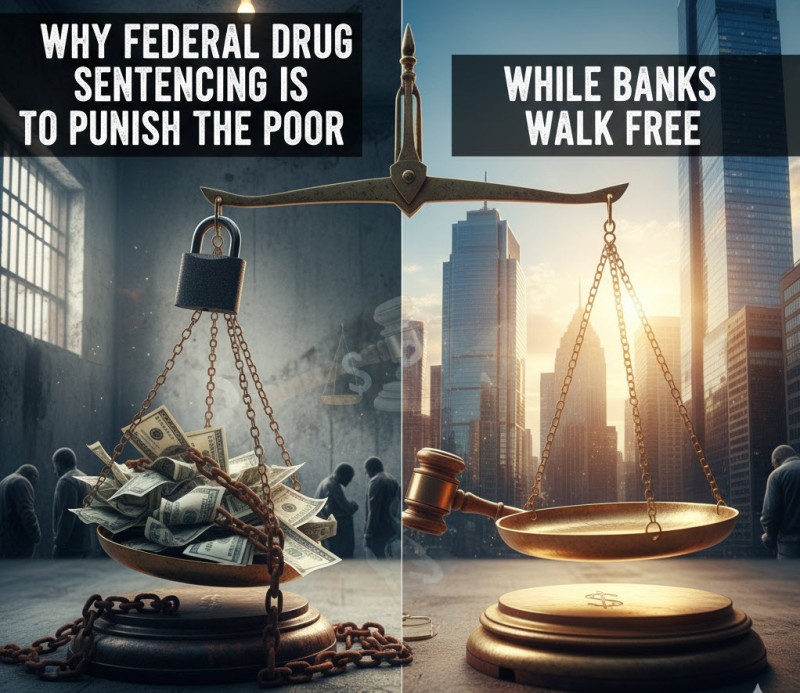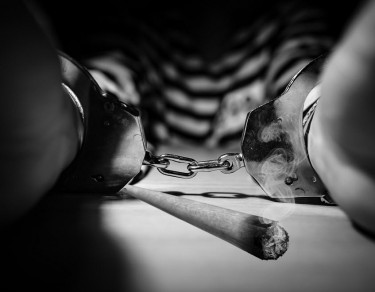
BOL-Shit: Why Federal Drug Sentencing Is Designed to Punish the Poor While Banks Walk Free
The United States Sentencing Commission just implemented amendments to federal drug sentencing guidelines that will, theoretically, reduce some of the most egregious injustices in the system. Starting November 1st, 2025, the Base Offense Level—the numerical score determining sentence severity—will be capped at 32 for people with "mitigating roles" in drug offenses, potentially reducing sentences for couriers, lookouts, and low-level distributors who were previously treated as if they were cartel kingpins.
This sounds like progress until you understand what it's fixing: a system so fundamentally broken, so deliberately designed to inflate sentences for the poorest and most vulnerable defendants, that calling it "justice" requires willful delusion. The BOL system—pun absolutely intended—is complete bullshit. It's an arbitrary scoring mechanism that transforms street-level dealers into major traffickers through mathematical manipulation, sentencing calculations that treat accumulated small amounts as massive quantities, and conspiracy laws that hold couriers responsible for drugs they never touched.
Meanwhile, banks that launder billions in cartel profits—HSBC alone processed $881 billion in suspicious transactions linked to Mexican and Colombian drug cartels—face deferred prosecution agreements and fines that amount to cost-of-doing-business. No executives go to prison. No bank officers receive BOL scores. The institution pays a penalty smaller than its quarterly profits and continues operating as if nothing happened.
This isn't accidental. This is the system working exactly as designed: punishing poor people, disproportionately Black and Latino, for low-level participation in drug distribution while protecting wealthy institutions and individuals whose involvement dwarfs street dealers by orders of magnitude. The new sentencing amendments are a Band-Aid on a gunshot wound. The entire framework deserves to be dismantled and rebuilt from principles of proportionality, equity, and actual justice rather than the current apparatus of class warfare disguised as drug policy.
The BOL System: Arbitrary Numbers, Life-Destroying Consequences
Federal sentencing operates through a convoluted scoring system that assigns each defendant a Base Offense Level between 1 and 43 based on perceived seriousness of the offense. For drug trafficking, BOL is determined partly through a Drug Quantity Table that uses grams involved to assign scores that—prior to amendments—ranged from 6 to 38. Higher scores mean longer sentences, with BOL 37 or higher potentially resulting in life imprisonment depending on criminal history.
Here's the first problem: two-thirds of people sentenced for drug trafficking received BOLs between 30 and 38, meaning the vast majority of defendants were being scored in the highest severity ranges despite most being low-level participants. This wasn't random distribution—it was systematic inflation built into how quantity is calculated and how roles are assessed.
The Drug Quantity Table treats all drugs as if they're equivalent in harm and market structure, which is absurd. It equates substances with vastly different pharmacology, addiction potential, and social impact. Methamphetamine—unlike almost all other substances—is criminalized according to purity rather than quantity, meaning defendants face enhanced sentences not for distributing more drug but for the drug being higher quality. Over 80% of drug trafficking cases with BOL 38 involved meth, demonstrating how this purity-based system systematically inflates sentences.
The quantity calculation itself is designed to maximize scores. If you're a neighborhood dealer moving small amounts over time, prosecutors can aggregate every transaction across months or years to reach much higher total quantities. A dealer moving a few grams weekly can be charged as if they trafficked pounds by simply adding up weeks of activity. The law doesn't distinguish between someone moving 100 grams at once and someone who moved 5 grams weekly for 20 weeks—both get charged with 100 grams.
Conspiracy charges compound this inflation. Under federal conspiracy law, each member of a conspiracy is held responsible for the "reasonably foreseeable" drug quantities involved in the entire conspiracy, not just their individual role. A courier who transported drugs twice can be held responsible for every kilogram the organization moved during the period they were involved. They never saw most of those drugs, never profited from them, never controlled distribution—but they're sentenced as if they did.
The "relevant conduct" doctrine allows judges to consider uncharged and even acquitted conduct when determining sentences. This means a defendant found not guilty of certain charges can still have those acquitted charges increase their BOL and lengthen their sentence. You can be found not guilty beyond reasonable doubt but still punished for the same conduct under lower evidentiary standards during sentencing.
Prior convictions—even for minor offenses—increase criminal history scores that multiply BOL consequences. Someone with previous drug possession convictions faces dramatically longer sentences than first-time offenders for identical conduct. This creates cascading punishment where early encounters with the system make escape increasingly impossible.
Designed to Inflate: Why the System Crushes Low-Level Dealers
The BOL system isn't just flawed—it's intentionally designed to produce harsh sentences for people at the bottom of drug distribution networks while providing mechanisms for leniency toward those higher up who can cooperate with prosecutors.
Low-level defendants typically can't provide valuable information. A street dealer or courier knows their immediate supervisor and maybe a few peers, but they don't know organizational structure, leadership, or financial operations. They have nothing prosecutors want. High-level defendants know everything—supply chains, money laundering, leadership, corruption networks. They have everything prosecutors want.
The "substantial assistance" departure allows judges to sentence below guideline ranges if defendants provide valuable cooperation to prosecutors. This overwhelmingly benefits higher-level offenders who have information worth trading. The courier gets the harshest sentence because they can't cooperate meaningfully. The regional distributor gets a reduced sentence because they identified suppliers. The result is that organizational leadership often receives lighter punishment than low-level participants.
The sentencing amendments acknowledge this perverse dynamic by capping BOL at 32 for defendants with "mitigating roles"—those serving as couriers, running errands, acting as lookouts, or performing "low-level trafficking functions" like distributing user-level quantities for little compensation or with motivations other than profit. The guidelines now recognize that personal relationships or coercion might drive participation, not criminal ambition or profit motive.
This helps. A BOL of 32 means sentences roughly between 10 and 22 years instead of potential life imprisonment. But it still treats a courier motivated by desperation or coercion as deserving a decade-plus in prison. It still fails to acknowledge that "mitigating role" describes the vast majority of people caught in federal drug cases—people who are economically desperate, coerced by circumstances, or operating at subsistence levels while taking enormous legal risks for minimal economic gain.
The fentanyl-related amendments show similar dynamics. Previously, anyone convicted involving fentanyl faced a four-level sentencing enhancement if they "knowingly misrepresented" a substance as not containing fentanyl. In 2023, this was reduced to two levels if awareness was characterized as "willful blindness." Now it can be applied for "reckless disregard," which prosecutors will use more widely. This sounds like leniency until you recognize it's still enhancing sentences for people who likely didn't know what they were transporting or selling—the system just found a lower culpability standard to apply the enhancement more often.
Banks Launder Billions, Pay Fines, Walk Free
While the BOL system crushes low-level dealers with decade-plus sentences for moving small quantities, banks laundering cartel billions face deferred prosecution and fines that don't even appear on executive balance sheets.
HSBC provides the paradigmatic example. Between 2006 and 2010, the bank processed $881 billion in suspicious transactions with connections to Mexican and Colombian drug cartels. This wasn't passive negligence—HSBC deliberately weakened anti-money laundering controls to facilitate cartel banking. Mexican branches accepted $7 billion in cash deposits, often in boxes designed to fit teller windows, while compliance officers looked the other way. The bank provided financial infrastructure that enabled cartel operations on a scale no street dealer could imagine.
When this came to light in 2012, HSBC faced criminal prosecution. Instead, they received a deferred prosecution agreement and paid $1.9 billion in fines. No executives faced charges. No one went to prison. The bank's stock price recovered within months. The fine represented roughly five weeks of HSBC revenue—a rounding error for an institution that had enabled nearly a trillion dollars in suspicious transactions.
Compare this to the courier transporting 100 kilograms who receives a BOL of 38 and faces decades in prison or life. The courier handled $2-3 million in drugs. HSBC facilitated movement of hundreds of billions. The courier gets life. The bank gets a fine.
This isn't an isolated case. Wachovia (now Wells Fargo) laundered $378.4 billion for Mexican and Colombian cartels between 2004 and 2007. They received a deferred prosecution agreement and paid $160 million in fines—less than 2% of the bank's 2009 profit. No individuals faced charges.
The double standard is obscene. When banks launder cartel money, prosecutors claim criminal prosecution would destabilize financial markets. When street dealers move small quantities, prosecutors claim harsh sentences deter crime and protect communities. The reality is that banks provide infrastructure that enables cartels to operate at scale, converting drug proceeds into legitimate capital that can fund violence, corruption, and territorial control. Without money laundering, cartels can't function. They need banks more than they need street dealers.
Yet the BOL system applies only to individuals, not institutions. There's no Base Offense Level for corporations that facilitate cartel operations. There's no Drug Quantity Table measuring laundered dollars instead of trafficked grams. There's no conspiracy liability holding bank executives responsible for foreseeable consequences of deliberately weakened compliance programs.
This is by design. The criminal justice system exists to control poor populations, not wealthy institutions. When low-level dealers are systematically crushed with inflated sentences while banks enabling billion-dollar cartel operations face negligible consequences, the message is clear: justice is for people who can't afford lawyers to negotiate deferred prosecution. Everyone else gets the BOL system.
The Sticky Bottom Line: Reform the System or Burn It Down
The November 2025 sentencing amendments represent marginal improvement in a fundamentally unjust system. Capping BOL at 32 for mitigating roles will prevent some life sentences for couriers and lookouts. Expanding the reckless disregard standard for fentanyl enhancements might reduce some excessive punishment. These changes help individuals caught in the system's gears.
But they don't address the core problems. They don't fix the Drug Quantity Table that aggregates small amounts into massive quantities. They don't eliminate conspiracy liability that holds minor participants responsible for entire organizational conduct. They don't prevent judges from considering acquitted conduct during sentencing. They don't create BOL scores for banks laundering cartel billions. They don't mandate prison time for executives whose deliberate policy choices enable drug trafficking at industrial scale.
The Sentencing Commission considered amendments to methamphetamine sentencing—the substance most responsible for BOL 38 convictions—but never voted on them. The system's most egregious injustice remains unaddressed because fixing it would reduce sentences too much for political comfort.
The entire framework is BOL-shit. It's designed to produce harsh punishment for economically desperate individuals while protecting institutions whose involvement dwarfs street-level participation. It's built on arbitrary numbers, quantity manipulations, and conspiracy theories that transform couriers into kingpins. And it operates within a broader drug war that's always been about controlling poor and minority populations rather than reducing drug harm or stopping cartels.
Real reform requires abolishing mandatory minimums, ending conspiracy enhancements, prohibiting aggregation of small quantities over time, creating actual proportionality between conduct and punishment, and—most critically—applying criminal liability to institutions and executives who enable trafficking through money laundering. Until banks face the same BOL system as street dealers, until executives risk decades in prison for facilitating cartel operations, the system will remain what it's always been: class warfare disguised as drug policy, crushing the poor while protecting the powerful who profit most from prohibition's existence.






